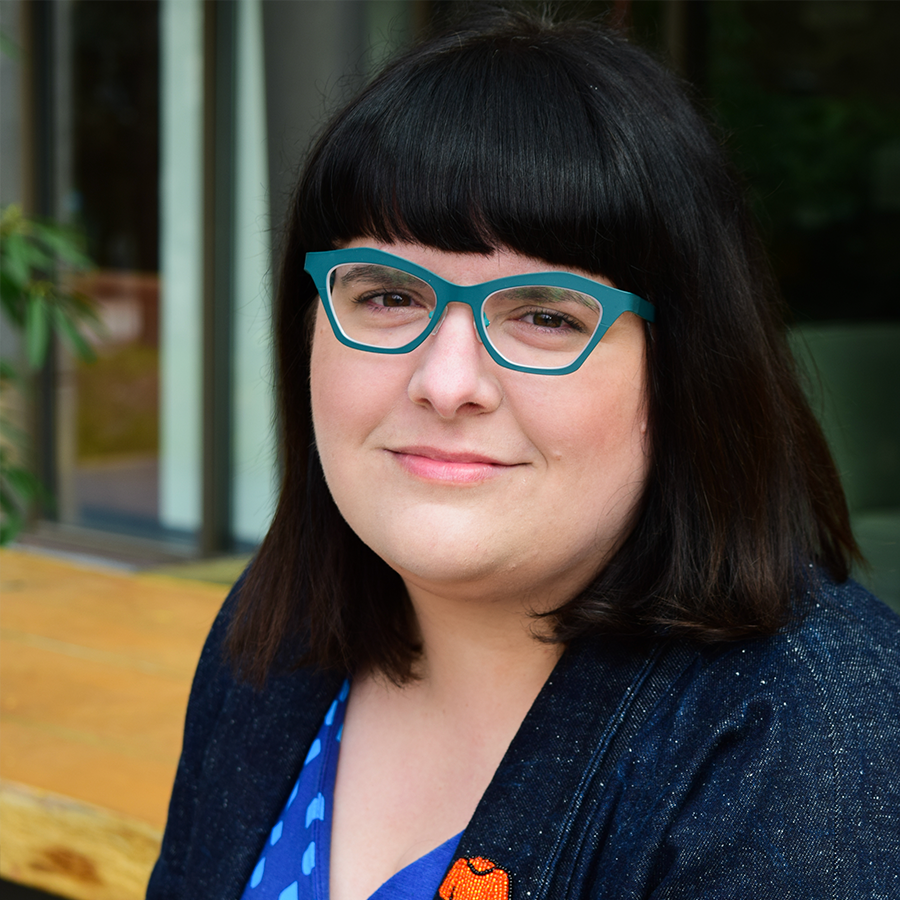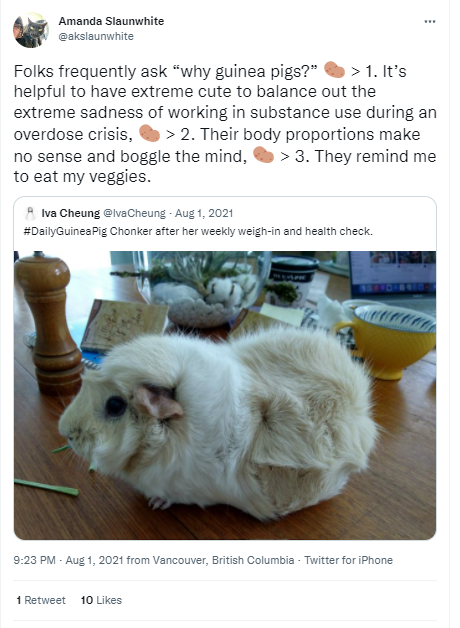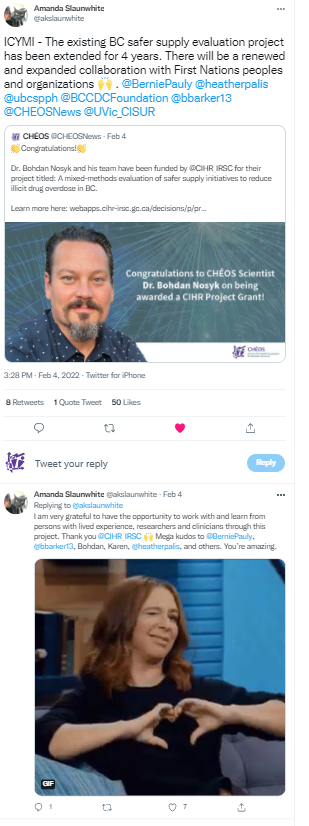In a time of increasing mental health awareness and fighting substance use stigma, CHÉOS’ newest Scientist Dr. Amanda Slaunwhite has embraced social media to share her research, combat misinformation, and connect with colleagues. She also shares the occasional furry potato, a.k.a. guinea pig, post on her Twitter feed for a dopamine release among the often sombre work she does.
“I’m often staring at coroner data all day and my research focuses on overdose, so looking at pictures of guinea pigs is a strong counter-point to that,” shared Dr. Slaunwhite, senior scientist at the BC Centre for Disease Control. Her work focuses on improving the health of people with lived experience of substance use, overdose, and incarceration. She applies administrative health data and community-based participatory methods, using both qualitative and quantitative research methods for her projects.
Inspired by lived experience

“I initially started working in the field of mental health and substance use as a way to understand what was going on with my own family situation where I was supporting my father. I also wanted to make sense of the changes that I was personally experiencing,” said Dr. Slaunwhite. “My work since has also helped me better understand my own mental health and substance use experiences, which were at the forefront of my teens and twenties.”
It wasn’t until she moved to Alaska that Dr. Slaunwhite started working on overdose prevention and realized that she wanted to make this area her research focus. “Alaska was experiencing a lot of overdoses and I was asked to help investigate why it was happening, especially in a few state-run prisons. This was also my first foray into working with incarcerated people for research, which is now an important part of the work I do.” She also did some work on opioid use during pregnancy while in the north.
While completing her doctoral training, she noticed that she didn’t have many local colleagues to work with in this field inspiring her to start her engaging and informative Twitter account.
Twitter talk
“I found Twitter to be a really helpful way to connect with people who were doing things that I was interested in,” emphasized Dr. Slaunwhite. “It was a nice easy way to find people doing similar work. Also, I’m really into the news, politics, and social policy. Twitter is an excellent way to keep up with what is going on in the policy area and what people are talking about it.”
But what about the keyboard warriors, online trolls, and numerous other impugning online personas?

Perhaps unexpectedly, considering the nature of her work, Dr. Slaunwhite has not had any notable bad interactions on Twitter. “I know some people have had some really negative experiences on Twitter, so it is out there, but nothing like that has ever come my way,” she said. “It is a risk when you are putting work out there, especially in fields where there can be very strong opinions. But I feel like, if you avoid discriminatory or stigmatizing language and have done your due diligence, especially by working with and being around those with lived experience to ensure your research is person-centered, it’s okay to share what you are doing. As researchers, we need to open ourselves up to criticism and take what people say to heart.”
Dr. Slaunwhite also finds it to be very helpful to connect with people, whether it be fellow researchers, policy-makers, or the public. “I know that the research that we are doing in mental health and substance use is influencing policy and advocacy so I find that Twitter is a helpful way to get the word out about our work. It is especially helpful for connecting to researchers outside of B.C. and Canada,” she explained. “I really like it because it allows me to get a sense of what people are saying about certain things. Even though it may not necessarily be representative, it still gives an idea of how people are approaching safer supply, for example, and thinking about all the diverse perspectives and opinions you can come across.”
Improving research transparency
Accessing information, regardless of its accuracy, is easier than ever, which is why there is increased emphasis on knowledge translation and communication within the research community. With knowledge translation strategies often a mandatory component of funding applications, many in academia have started embracing social media to share their work with colleagues, and the world.
Dr. Slaunwhite added, “Transparency in research is important, as is being able to connect with those who are directly affected by your research. It might make you feel uncomfortable or awkward, but it’s the right thing to do and you can learn so much about what is current and happening in your field and in related fields, and have your work be seen too. I would love to see more of my colleagues using Twitter!”

Social media facilitates connection, and it was through Twitter that Dr. Slaunwhite became a part of the BC Support Unit Tapestry Project. This project focuses on helping academic and diverse patient researchers forge and maintain meaningful partnerships in patient-oriented research. As part of this effort, the researchers tweeted about their need for a lead for the rural/remote section and Dr. Slaunwhite connected with them and subsequently became involved in the project. Since then, she helped create an educational module that is currently being evaluated.
“During this project, I’m able to rapidly communicate and share information with my colleagues using Twitter, including a community partner we worked with who has lived experience. It’s far more efficient messaging there than navigating cumbersome email threads,” she said.
Advice for Twitter
Dr. Slaunwhite’s Twitter feed is an excellent hybridization of both a professional researcher and a personal account. She varies her posts about papers, new research, advocacy, and talks with personal posts, interesting news articles, relevant policy changes, and adorable pictures of furry animals.
“I feel it’s more authentic in some ways when people combine elements of themselves and their lives with their professional persona. It allows people to get to know you a little too.”
And her advice for those curious or hesitant about going on social media?
“Just do it! Create an account! It may take a while to figure it out, but it’s important to be open to it and approach it in a way that all feedback is good feedback. Be aware of the area you are working in because it could be more or less controversial. If your research area is controversial, be ready for that and don’t take feedback personally. Having an account is pretty helpful to keep an eye on what is coming out around the world and chat with researchers when you have questions,” she said. “It is a nice communication tool and a little less intimidating than a slough of emails. I see it as an ‘at the water cooler’ moment to casually start a conversation about a research topic, rather than a formal, easily overlooked email.”
In fact, when Dr. Slaunwhite was a newer investigator, she used it to help her navigate new changes to CIHR’s Program Grant scheme. She was able to publicly ask questions on Twitter, which were answered and helped her figure out the details because people would respond and assist her, which in turn helps others who may have similar questions.
Upcoming projects
Evident by her enthusiasm for Twitter, Dr. Slaunwhite is passionate about connecting people. She is leading a new Public Health Agency of Canada-funded project to provide peer education programming in federal prisons in BC. The project is a five-year peer support program that will use Zoom to support peer health educators in federal prisons throughout B.C. using the Project ECHO Peer Education model from the University of New Mexico (video). They will also be connected with clinicians and experts at CHÉOS and the BC Centre for Disease Control so that peer health reps can be briefed by clinicians on new or emerging health issues or treatments, or can ask questions they have from their peer support work in their housing units.
Although this project is using Zoom, the current go-to for remote communication, Dr. Slaunwhite is glad that facilities are reopening. “We are able to return to the institutions and work with people. It’s really exciting, especially as they have been locked away with minimal access to programs, services, friends, and family during the pandemic. I’m looking forward to working with people again!”


